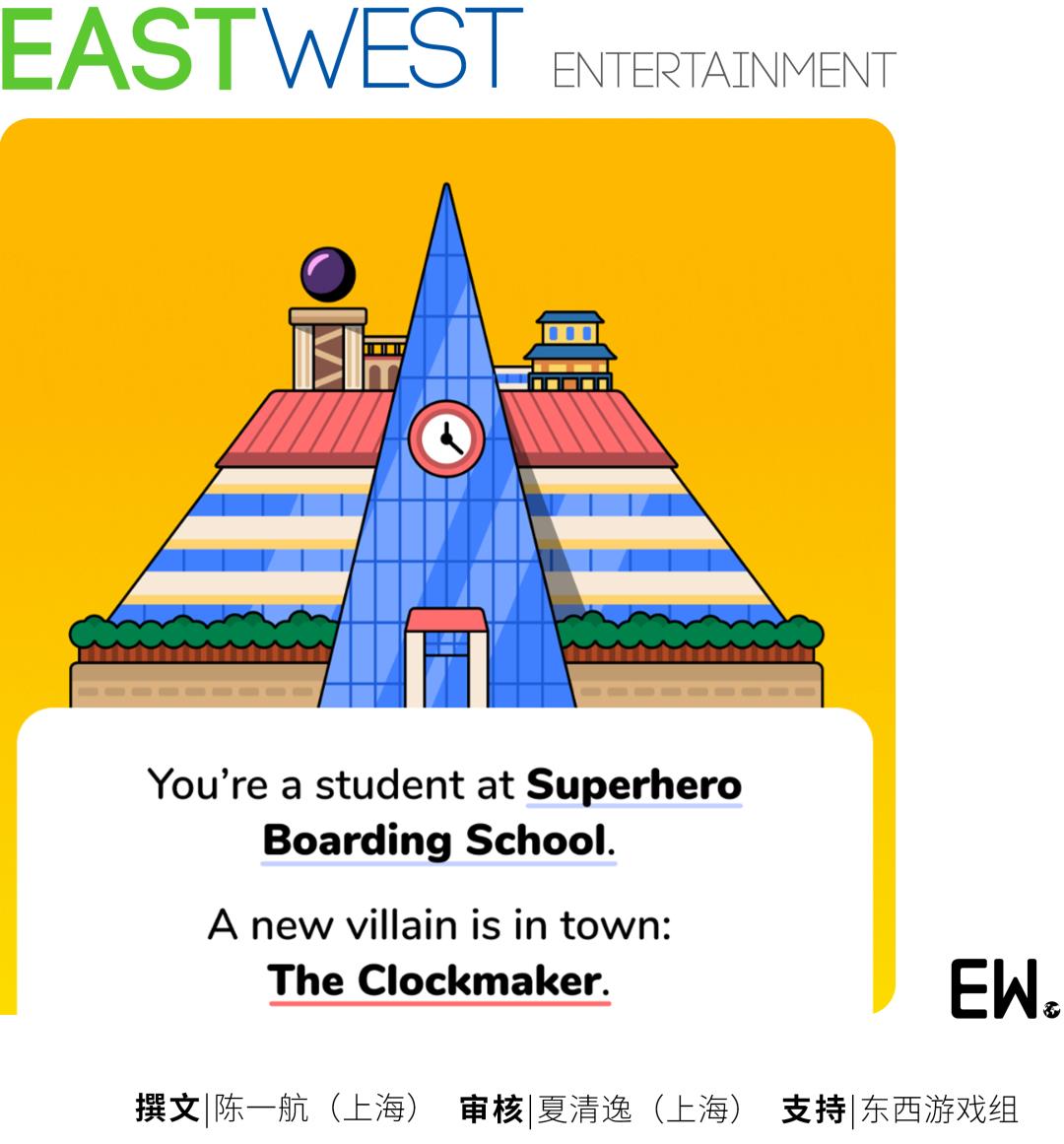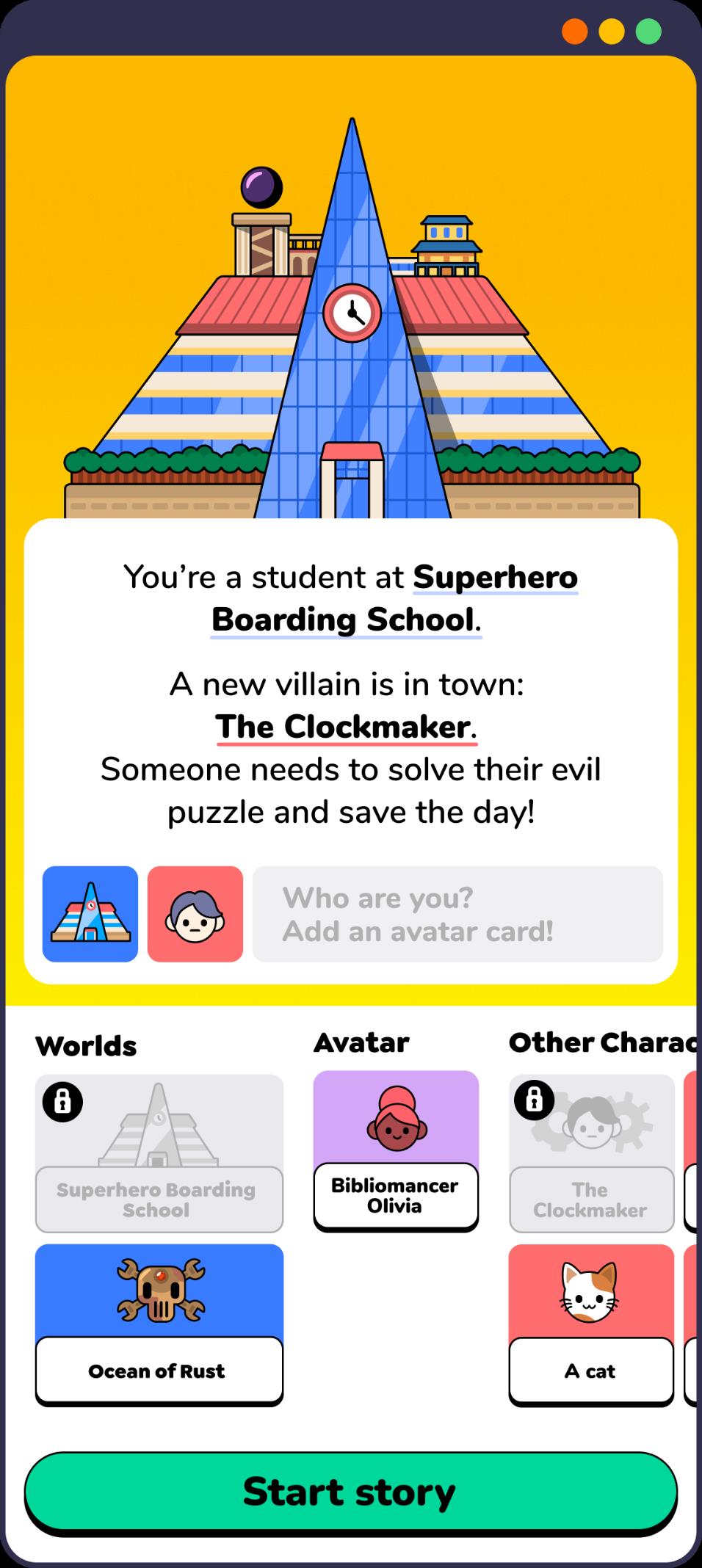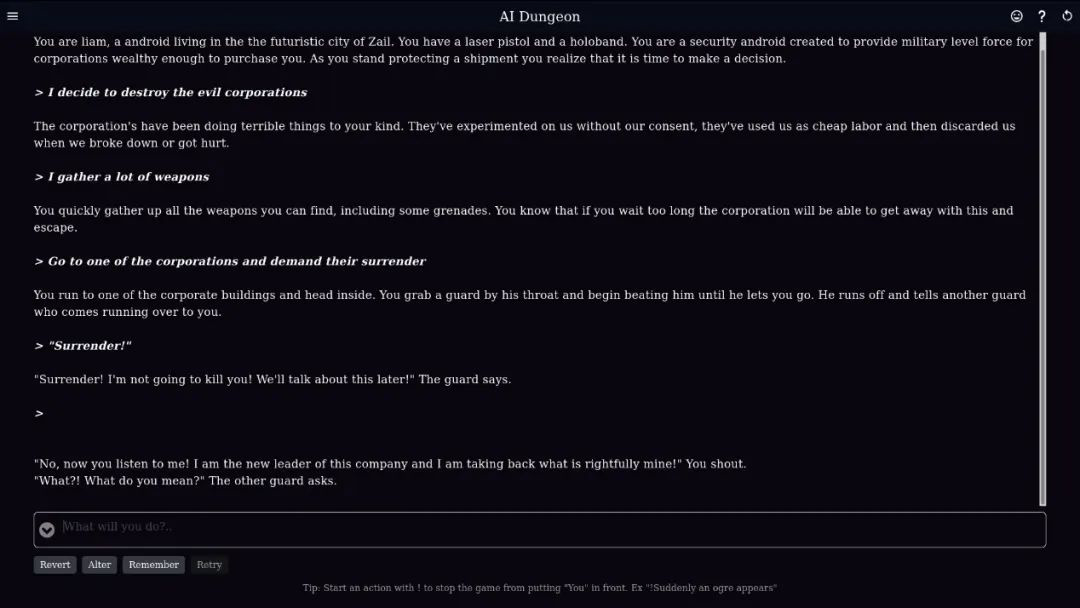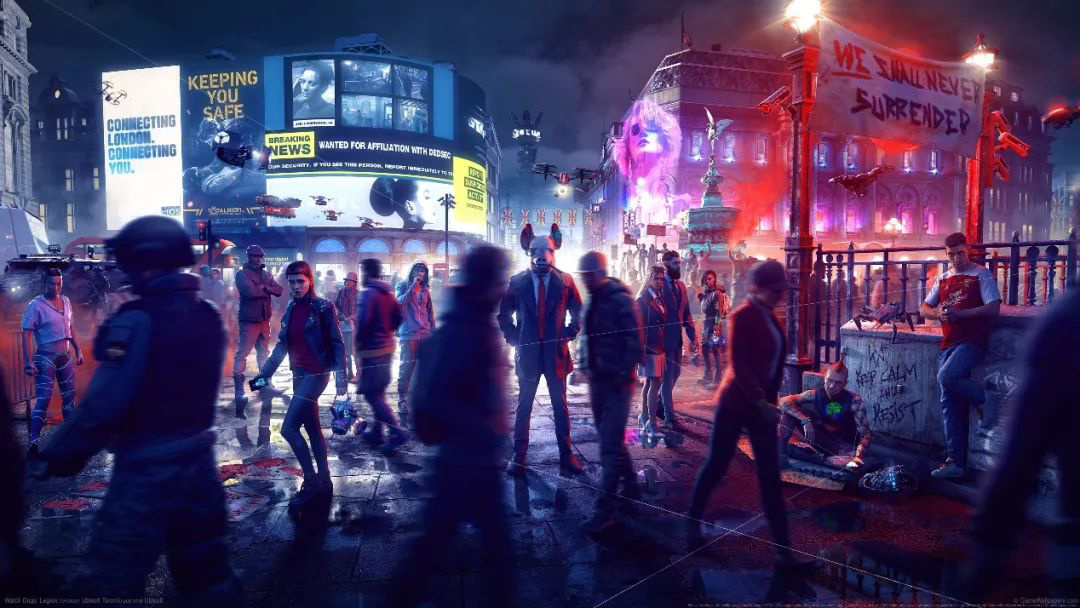
"Thursday will be a fixed game day, paying attention to the entertainment innovation brought by game technology and experience iteration. Welcome to contribute and communicate. Please see the end of the article for contact;For more game cases and technology application research, please pay attention to the brand account of Dongxi Entertainment Game Group.“
Technical development has always been an important force leading the iteration of game products. With the more extensive application of AI technology in the game industry, new game tracks are gradually bred.
Recently, Hidden Door, an American startup company, announced its first product-Hidden Door, a social AIGC narrative platform, and announced that it had completed the financing of US$ 2 million, which was led by the European venture capital fund Northzone, followed by funds such as Makers Fund and Brooklyn Bridge Ventures, and Roblox CTO Dan Sturman also participated as an angel investor.
Hidden Door is a narrative game platform based on AIGC-related technologies. Through AI natural language generation technology, it stimulates the potential of players’ story creation and allows many players to take risks in stories aided by AI.
Hilary Mason, CEO of Hidden Door, said, "This project is mainly to create game narratives together, establish social connections among players, and enable anyone to create unique stories. The challenge is how to develop an AI system, which can not only allow AI to create with players, but also ensure the diversity and security of stories. "
Compared with game design, AI technology and algorithm are more critical factors for the success of this kind of AIGC narrative game platform. Hidden Door is not the forerunner of this track. As early as 2019, a similar product AI Dungeon appeared. However, due to the limitations of AI technology, AI Dungeon has already experienced risks such as uncontrollable AIGC content and insufficient security.
Although the technology is not mature enough before, AIGC has brought new mechanisms and experiences to the interactive narration of the game, and helped the game narration, which used to emphasize single-player experience, to be more closely combined with social play, thus giving birth to a new business model, thus attracting companies such as Hidden Door to explore and invest in this direction.
Hidden Door:
AIGC narrative game platform to create multi-person creation and social space
Founded in 2020, Hidden Door is a graphical multiplayer game platform, which uses AI to help players build a complete game narrative. Players only need to give a general world view framework and story outline, and then AI can complete the filling of NPC, items and other content.
The platform can store the world and stories built by players and AI, and players can play the roles in these stories, have a 2D virtual image, and manipulate the characters to travel and take risks in the world by inputting natural language commands.
The platform will be tested this year, but its game threshold is not high, and the natural language texts given to AI are only simple sentences. The first users are aimed at children between 9 and 12 years old.

Hilary Mason, founder of Hidden Door, believes thatDuring the epidemic, "desktop role-playing games such as Dungeons and Dragons are more popular than ever, and storytelling has become a popular social activity in games such as Roblox and Minecraft."
At the same time, in the process of accompanying children to tell stories during the epidemic, she found that narration was a challenge for ordinary people. Hilary Mason was inspired by this and chose to use AI to help players to build more interesting game narratives.
Hilary Mason believes that the value of introducing AI is mainly reflected in the release of narrative creativity of players. "Players may be inspired by an idea, but they will find that it takes a lot of work to create stories around it."
In order to better understand the Hidden Door product, Hilary Mason compares the game experience of this product with the board game Dungeons and Dragons.The role of AI in the game is similar to that of DM(Dungeon Master) in Dungeon and Dungeon.
Dungeons and Dragons is a classic desktop role-playing game, which is regarded as the predecessor of electronic role-playing games. With a complete set of rules of the game, players play the role of adventurers to participate in the game, relying on paper and pen to record the values and equipment props of the role, telling the players their actions in oral language, and then deciding whether the action is successful by rolling the dice.
Because each game of Dungeons and Dragons is based on the existing complete world view and story, and the behavior of the characters is completely based on the player’s dictation, the game has a high degree of freedom, and the role of DM is to respond to the player’s behavior according to the rules of the game and the story.
For example, before cleaning up the monsters outside the city in the main plot, the player chooses to ask the help of the Lord in the city, while DM will play the role of the Lord, and decide to give the player more or less assistance according to whether the Lord is stingy in setting.
Back on the Hidden Door, AI plays the role of an auxiliary builder of plot and world view, and at the same time replaces the original role of DM, which can help players to free themselves from complex creation and rules and fully devote themselves to the game.
In other words, the creativity of the story comes from people, and AI is more like a helper. When the player is exploring the game, AI is responsible for perfecting the overall story structure, filling in the gaps in the world view and describing the details of the story. When players lack the ability of narrative rhythm, story tension and conflict management, they can also be supplemented by AI.
However, this also means that products like Hidden Door have high requirements for AI’s natural language ability and data processing ability.
Hilary Mason is a data scientist herself. She founded Fast Forward Labs, an AI research company. The company’s first research was about natural language generation. Matt Brandwein, another founder of the company, was the product leader of Cloudera, a data platform company, providing AI and data service support for companies such as eBay and Nokia.
AIGC narrative game platform technology and mode iteration direction;
More controllable and visual
In fact, Hidden Door can be regarded as the second generation AI narrative game platform, and a similar product named AI Dungeon appeared in 2019.
AI Dungeon is developed by Latitude, a startup company, and is based on the rules of the game similar to Dungeons and Dragons, but it is different from Hidden Door in the game mode. If Hidden Door is an "expansion" in the player’s mind, then AI Dungeon is a "continuation".
AI Dungeon is like a novel written by a player and AI. In the game, there are only words without any graphics. The player is responsible for inputting simple sentences to control the actions and dialogues of the characters, while AI is responsible for the subsequent plot development of the player’s text.

AI Dungeon’s text generation technology is completely based on the GPT model released by OpenAI. AI Dungeon attracted more than 100,000 players within a few months after the official version was launched in December 2019. To this end, OpenAI also provided a professional version for Latitude, and promoted it as a successful product of commercialization of GPT model.
GPT model has now developed to GPT-3, which has become an important technology of AI narration in many games. In the VR game "Modbox", there is already a test version that applies GPT-3 to NPC characters and can have a simple conversation with players.
However, this technology has not been installed in Modbox, because OpenAI has not been authorized to open GPT-3 in the game field on a large scale. One of the important reasons behind it is that GPT-3 still has certain limitations, and some disadvantages have been highlighted on AI Dungeon.
First, it is uncontrollable.. As an AI text generation technology, GPT-3 does not have a sense of morality, and there is no criterion for judging whether the generated text is suitable for players of all ages. In addition, under the game mode of AI Dungeon’s "continuation writing", AI can easily produce illegal and pornographic content under the deliberate guidance of players. This problem began to spread on a large scale in 2021 and caused a bad influence on AI Dungeon.
Second, there are stereotypes.The machine learning of GPT-3 is completely based on the information of the whole Internet, and is influenced by various stereotypes on the Internet. This problem of GPT-3 was publicly discussed at a seminar held by researchers from OpenAI and Stanford University in 2020, but no good solution has been found yet.
In order to solve the above two problems, AI Dungeon had to launch a new filtering system in May, 2021, but the mechanism of this system was extremely rude. In order to prevent child pornography, even the word "five years old" was once not allowed to appear in the game. Moreover, this system has also been pointed out that there is a problem of reading the information of the player’s equipment, and there is a risk of information leakage.
Hidden Door realized the limitations of GPT-3 model, and even published a blog post in official website to point out the problems of GPT-3.On the basis of the first generation AI narrative game platform AI Dungeon, we choose to iterate in the directions of natural language generation technology, game mode and game graphics.
First of all, based on the natural language generation technology accumulated by Hilary Mason in Fast Forward Labs, Hidden Door has developed a new narrative game engine, has an independent machine learning training model, and has set a safer content production standard.
Secondly, it is also the difference of the game mode mentioned above. Hidden Door expands according to the outline provided by the player, which is more controllable.
Finally, AI Dungeon is the expression form of pure words, while Hidden Door introduces the visualization form of 2D graphics generated by AI, which is more intuitive in presentation form.

How AIGC Remodels Interactive Narrative Games
Experience and business model
In recent years, the game has become an important scene where the concept of AIGC has landed, and it covers many dimensions from game development to player play.
Among them, from the current development stage of AI technology, AIGC is closely related to game narrative. It is mainly embodied in shaping a brand-new narrative experience in traditional 3A games, but when it falls into a broader category of interactive narrative, it will bring new inspiration to this category to open up social gameplay and business models.
In fact, as the open world becomes more and more complex, there may actually be thousands of NPCs in a world, but most of them are ordinary passers-by. Some games are trying to make every NPC play a role in the game narrative, and choose to introduce AIGC for this purpose, so as to make the stories of these NPCs intertwined.
For example, in 2021, Ubisoft released Watchdog: Legion, which is a game without a protagonist. Players can play any NPC in the game. Ubisoft, through the self-developed aLiVE group AI system, gives NPC in every city independent personality, ability, life, story and interpersonal relationship, and each NPC has high interactivity and coherence.
You saved an NPC’s life one day, and then that NPC’s friend may give you a helping hand. You see a pickpocket NPC at the gate of the subway station. After a while, you may see him running away after the police. Thanks to the diversity of NPC AI, each player often has a unique game narrative experience in Watchdog: Legion.

From the point of view that the interactive narrative of the game extends to the whole interactive narrative category, the emergence of AIGC narrative game platforms such as AI Dungeon and Hidden Door has actually opened up more social gameplay and business models for interactive narrative games.
Interactive narrative games have accumulated in the European and American markets for many years, especially in the European and American mobile game market, there have been head products such as Episode》《Choice that have developed for many years and have a stable audience. Among them, "Episode" has the best commercial performance and is stable in the top 60 of the best-selling list of iOS games in the United States. This category of track has even attracted China manufacturers to go to sea, such as "Chapters" launched by Chinese online, which ranks among the top 200 best-selling products.
Episode, as a representative old-fashioned product, provides a game platform for players to play and create interactive stories, mainly for young female users. The platform now has 150,000 stories, totaling more than 10 billion story views. In Episode, the story is mainly presented in the form of role dialogue, supplemented by simple CG and animation. Players can connect different stories by choosing different answers in each conversation.
However, the limitations of Episode are becoming more and more obvious. Its gameplay is completely a single story experience, and its social attributes are relatively weak. Players use the built-in UGC creation tools to share their own stories or discuss them on the built-in social network. In terms of business model, Episode takes the common form of free and in-house purchase. Players need to wait for several hours to unlock new chapters, otherwise they need to spend money to unlock them directly. In addition, special options and story lines in some stories also need to spend money to unlock them.
Products such as AI Dungeon have explored some new paths in interactivity, sociality and business model because of the addition of AI technology.
For example, in games such as Episode, the interactivity is reflected in the fact that players can enter different story branches according to different choices, but on the whole, the story is linear and fixed, which cannot support multi-person participation.
And "AI Dugeon" has developed an AI model to deal with multiple players through AI technology, which can give feedback on the interaction of different players. In the business model, AI Dungeon provides more advanced AI models as value-added services to players, such as smarter monster AI models. In the traditional RPG game, Krypton’s pet has a numerical advantage over the free player’s pet, but in AI Dungeon, it is characterized by higher intelligence and stronger interaction.
Of course, due to the immaturity of AI technology, players of "AI Dugeon" need to interact with AI in turn, which greatly slows down the overall game rhythm, and when there are too many people, data confusion often occurs, resulting in poor experience.
Therefore, it can be said that at present, the experience upper limit of this kind of AIGC narrative game platform is mainly determined by the AI technology level, and the more preferred productization idea can make up for the experience to some extent, which is also the exploration direction and operational space of Hidden Door as a new generation product.
EW-Entertainment
Recent Topics and Related Contents






